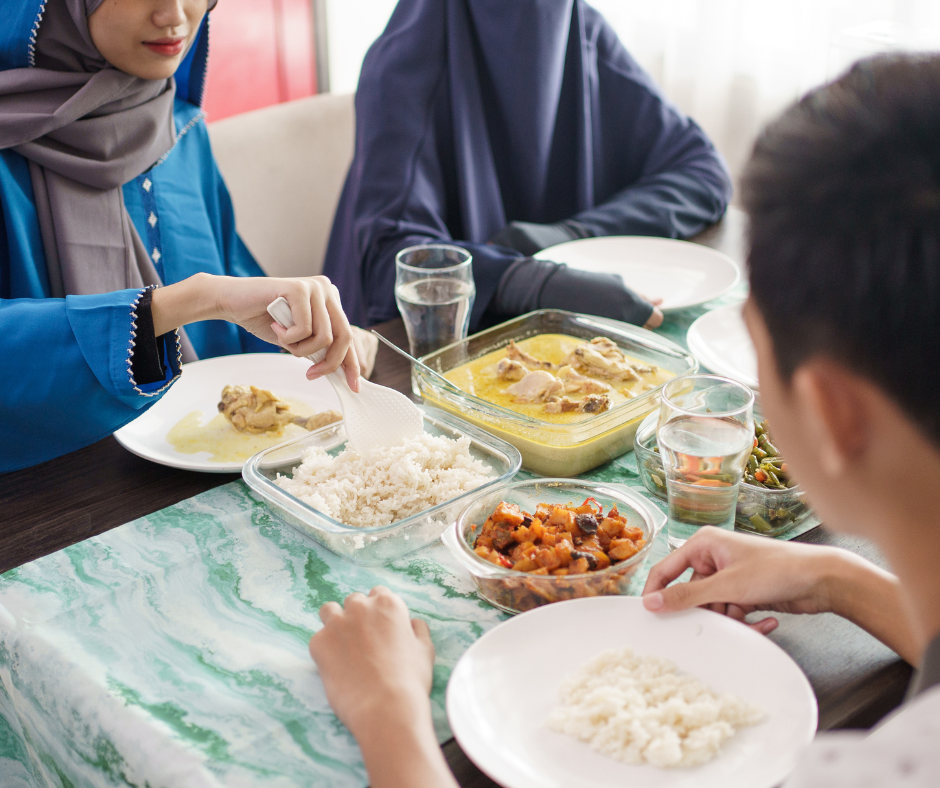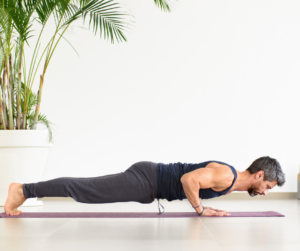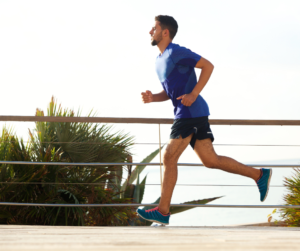Fasting, spiritual and personal development are the key observances that Muslims undertake during Ramadan each year.
Many athletes are indeed open about the challenges they encounter concerning their performance and recovery. It is also true that those athletes that get their nutrition, hydration, sleep, and training strategies correct during Ramadan, see major improvements in their mental and physical health.
There is no doubt that the mind is a powerful thing and by following several nutritional, hydration, and training guidelines, you ensure a successful training month through Ramadan.
Let’s have a look at how you can make this possible…

Nutritional Strategies For Runners During Ramadan
Taking in appropriate amounts of carbohydrates and proteins before and after exercise is vital if you want to recover and perform adequately while training during Ramadan.
At least one hour before starting training consume easily digestible foods such as:
- Cereal bar
- Slice of gingerbread
- Rusk
- Fruit puree
- Plain yogurt
Many common foods associated with Iftar are rich in carbohydrates (e.g. figs/dates) and high-quality protein (milk and laban yogurt).
The substantial meal after prayers typically features savory dishes with carbohydrate-rich components (rice) and protein (meat or fish). Arab breads and other varieties provide worthwhile amounts of carbohydrates. Other combinations of carbohydrate and protein include Thareed (bread containing), starch pudding (milk), and rice porridge
Care should be taken with Ramadan treats, since many are very high in fat. Some recipes can be adapted to promote carbohydrate content and reduce fat (e.g. replace puff pastry in Um Ali with bread)
Ma’amoul, dried fruits, and nuts are suitable snacks. When eating opportunities are limited, drinks with high energy/nutrient density can be useful to meet high-energy requirements. These include special nutrient feeds used in clinical nutrition situations, liquid meal supplements, and fruit/milk smoothies.
Many of the special Ramadan drinks (e.g. Jellab) are energy-rich and those based on milk/laban also provide high-quality protein.
Suhoor meals that are high in carbohydrates include rice with egg, cheese, and milk. Beans and foul while good sources of many nutrients may not be suitable if consumed close to a training session
Example of nutrition strategy during Ramadan:
5h00 Final pre-dawn meal (Suhoor)
- Carbohydrate (2 g/kg)
- Protein (0.4 g/kg)
- Yogurt with fruit; toast with egg and grated cheese and fruit juice
6h00
- Slow-release protein (0.4 g/kg), e.g. casein
- Milk, yoghurt (casein)
6h30
- Sunrise
- Beginning of fast
9h00 – 14h00
- Preferable light training sessions
14h00 – 18h00
- Resting preferred
- Nap if possible
19h00 Sunset
- Post-sunset recovery shake containing 1 g/kg carbohydrate and 0.4 g/kg protein to break the fast
- Meal replacement shake, recovery shake, or smoothie with milk/yogurt, fruit, and peanut butter or protein powder
- Follow up with strength or high-intensity training
Making sure you do the correct strength training is important. The good news is we’ve created a free strength training plan for runners that you can download by clicking here.
19h30 – 20h00 Iftar
- Iftar meal containing 4 g/kg carbohydrate and 0.4 g/kg protein
- Chicken, fish, or beef served with rice, legumes, and vegetables. Add fluid to the meal, e.g. drinking yogurt, milk, fruit juice, or cordial.
22h00
- Slow-release protein containing 0.4 g/kg protein with some carbohydrates alongside (1 g/kg body mass)
- Yogurt with fruit and nuts or seeds OR Cereal and milk OR Peanut butter sandwiches with banana and milk
Now that we know what foods you should be consuming when you break the fast, let’s have a look at another vital consideration you should be taking…

Hydration Strategies For Runners During Ramadan
You must hydrate adequately to compensate for the body fluids lost while you are training or when you are fasting.
Prepare for your day of no liquids by drinking water as often as possible during the night, keep a big bottle of water next to your bed so that when you can, try and drink about a cup at a time.
Pro Tip: Food also plays a huge part in keeping you hydrated. Foods that contain a lot of sugar can dehydrate you while fruit can provide extra hydration.
Highly hydrating fruits include:
- Strawberries, Cranberries & Raspberries
- Peaches
- Watermelon
- Cantaloupe
- Grapefruit
- Pineapple
Throughout Ramadan and especially if you are training during Ramadan, keep a close eye for dehydration symptoms, as soon as you start to notice any of the symptoms listed below you should consult a doctor immediately.
- Dry and wrinkled skin
- Feeling exhausted
- Unable to concentrate
- Dizziness
- Constant fatigue
- Sleeping more than usual
- Dark Urine
A good way to know if you have hydrated enough is by looking at a Urine color chart.
If it’s a very light straw color or a very light yellow color, you’re good to go run and enjoy it.
If it is very dark or even orangey, then it means you are probably in a dehydrated state, especially the first-morning batch of urine
Athletes during Ramadan should make increased efforts to ensure that exercise is commenced euhydrated and that rehydration occurs as soon as it is feasibly possible. This is really only a problem when exercise is performed before the Iftar meal.
It may also be an option to utilize cold mouthwashes during exercise to help prevent feelings of thirst, however, this again will require discussion with religious authorities.
It is important to remember that rehydration should not only be focused on the restoration of fluids but also must consider the specific electrolytes that will be lost especially sodium.
This may involve the addition of electrolytes to fluids especially if athletes have performed prolonged exercise in the heat before the Iftar meal.
Drinking sufficient fluids from Iftar until Suhoor is crucial while taking into consideration the need for additional electrolytes. This can be done either by drinking rehydration solutions or by drinking and eating at the same time. This will help your body to retain water.
It should be noted that it would be unwise to attempt to hyperhydrate by drinking copious amounts of water at the Suhoor meal as this can lead to prompt diuresis and ultimately could contribute to further dehydration.
Training For Runners During Ramadan
Beginning of fast:
- Wake up early
- Weigh yourself
- Light exercise in the morning
- Reduce training as much as possible in the afternoon
- Avoid exposing yourself to sunlight
- Keep yourself cool during the day by taking showers or going swimming
- During the training sessions in the day, wear light-colored, loose, and lightweight clothes (fabrics that allow sweat evaporation) and a lightweight cap of a light color
End of fast:
- Weigh yourself before the meal. This will give you an indication of your hydration levels.
- Drink small sips until your stomach is comfortable. Then increase to drink at least the equivalent of the weight you lost during the day.
- Include foods that are rich in water such as milk, smoothie, vegetable juice, and soups.
- Eat small amounts initially and follow up with bigger meal
- Train with carbohydrates and fluids during the session.
- Have a bigger meal after training.
- Limit fatty foods and very sweet food.
- For the main meal, have a lean protein, e.g. skinless chicken, beef, veal, or fish kebab, combined with starchy foods and vegetables.
- Desserts with couscous, fresh and dried fruit
- Avoid stimulants such as coffee, tea, sodas, and energy drinks
Let’s have a look at some common questions asked by people wanting to continue training during Ramadan…
What type of foods people should consume when they break the fast especially if they plan to train during the day?
Iftar
- Most traditional dishes served at iftar are good sources of carbohydrates (like figs) and high-quality proteins (e.g. milk).
- When the exercise is planned just before iftar, these dishes can be consumed as post-exercise recovery snacks and may be followed by another training session and another meal.
- High-quality proteins are necessary for recovery after resistance sessions and must be part of the iftar meal or snack.
- You should take advantage of the possibility of drinking and eating during exercise performed after sunset. This will enhance your performance during training and will also contribute to achieving your nutritional goals.
- Sports foods, such as energy gels, drinks, and bars, are nutritious concentrates that are easy to ingest in these situations.
Suhoor (Pre-dawn meal)
- Eat as close as possible to sunrise and choose foods that contribute to sports nutrition needs for the day
- Base the meal on carbohydrate sources such as starches and fruits or dried fruits
- Include protein sources with a slow release
- Include food rich in water such as fruit juice, milk, smoothies, and fresh fruit
How Does Fasting Affect Health?
Overall, the balance of evidence suggests that from a general health perspective, there are no major health issues following Ramadan and there may even be health advantages.
The health benefits of intermittent fasting have been associated with positive changes in hormonal responses, oxidative stress, and inflammation.

How Does Fasting Affect Body Composition?
Research on body composition during Ramadan has actually shown that body fat may decrease, maintain or even increase dependent upon the actual diet consumed during this time.
Remember that Ramadan fasting does not always result in energy deficits.
If there is a high intake of energy-dense food and drinks (such as deep-fried food and food and drinks with high sugar content) during the feeding period, there can be unwanted gains in body fat.
Providing that nutrition support is provided, athletic body composition can be maintained throughout Ramadan.
How Does Fasting Affect Performance?
Given the fundamental role that pre-, during and post-nutrition plays in athletic performance, it would appear logical that prolonged periods of fasting would have major detrimental effects on both training and competitive performance.
The aspects of performance that are vulnerable particularly refer to repeated high-intensity efforts. However, research tends to suggest that performance can largely be maintained during Ramadan, via careful consideration of the training loads, time of training, and nutrition in the permitted non-fasting periods.
It’s safe to say that most runners are a competitive breed, which begs the question if they are training during Ramadan, is it safe to compete in races too? We find out in this article.
Should Runners Decrease Their Intensity & Volume?
Pro Tip: You need to take out the intensity and moderate the volume of your runs, personally I recommend running in the evening during Ramadan, breaking fast with a very small meal and some water, then heading out for a 45-60min run and then eating again and drinking after (and during the run).
Starting with lower-intensity and shorter-duration workouts, and gradually building up as the body adapts to the changes is what we recommend.
The most important thing to remember is that not everyone will react the same to their fasting and that’s why you need to start at a low intensity and see how your body reacts.
Here at Coach Parry, we encourage those who observe Ramadan to either moderate training BEFORE their final meal and drink in the morning or AFTER their initial light evening meal and drink BEFORE their bigger meal later on.
3 Different Successful Training Methods
Example 1:
Example 1 chose to keep their runs easy 3-4 times per week and limited to a maximum of 30-45 minutes.
They ran right after breaking the fast at sunset with a light meal like soup and then after training they would consume a bigger main meal. This allowed them to have the water and fuel they needed throughout their training. They chose to listen to their body and on days when they felt exhausted they would go for a short walk or do some yoga instead.

Example 2:
Example 2 placed a big focus on their nutrition, they were following a training plan so they stuck with it but decreased the intensity of their runs and strength training.
The training plan consisted of 4 runs a week, no more than 1 hour or 1.5 hours of running at a time, 2 strength sessions per week, and one complete rest day per week.
They chose to train after work in the afternoons so that they could break fast directly after training.
Example 3:
Example 3 felt that training in the mornings directly after breaking the fast worked best for them. They have a strenuous day job so training in the afternoons was too exhausting. They would run no more than 15 kilometers at a time at a very easy pace and make sure they fuel with slow-releasing carbs before heading for their morning runs.
They would however manage to do a very light-intensity strength class after breaking the evening fast but found that sometimes exercising that late in the evening affected their sleep.
They told us that training in the mornings and then not being able to sip water after your run is a big challenge and takes time to get used to.
Throughout Ramadan, it’s important to carry on doing what you enjoy and what keeps you happy and healthy. By hydrating adequately when possible, consuming nutritious meals when breaking the fast, by reducing your training intensity and volume, and by listening to your body’s needs, one can maintain their running fitness throughout the month safely and sustainably.



Comments are closed.